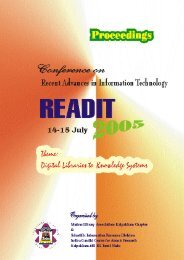READIT-2007 - Indira Gandhi Centre for Atomic Research
READIT-2007 - Indira Gandhi Centre for Atomic Research
READIT-2007 - Indira Gandhi Centre for Atomic Research
Create successful ePaper yourself
Turn your PDF publications into a flip-book with our unique Google optimized e-Paper software.
4. Intellectual assets/Knowledge assets: similar terms which comprises<br />
knowledge assets regarding products, technologies and market that a business<br />
own.<br />
5. In<strong>for</strong>mation Economics: study of the clear value of in<strong>for</strong>mation to an<br />
organization.<br />
6. Data Mining: the exploration and analysis of automatic and semiautomatic<br />
means of large quantities of data in order to discover meaningful patterns and<br />
rules.<br />
7. Knowledge Representation: the process of describing and presenting usable<br />
way of knowledge known by a person.<br />
8. Knowledge Mapping: finding existing knowledge in an organization and<br />
creating a detailed picture of skills.<br />
9. Concept Mapping: the visual summary of ideas or topics is related to each<br />
other.<br />
10. Knowledge Engineer: a person responsible of acquiring knowledge and<br />
developing data and rules <strong>for</strong> expert systems.<br />
STEPS IN KNOWLEDGE MANAGEMENT<br />
1. Knowledge Capture: a systematic procedure <strong>for</strong> organizing, structuring<br />
knowledge to make it accessible and usable to users.<br />
2. Knowledge Organization: an organization that values and uses its own<br />
knowledge in reflective ways that lead to profound shifts in directions, values,<br />
beliefs and operating assumptions.<br />
3. Knowledge Preservation: after collecting and codifying the knowledge, it must<br />
be stored in suitable <strong>for</strong>m in the organization’s knowledge base.<br />
MODULES OF KNOWLEDGE MANAGEMENT<br />
The KM system is primarily based on eight vital modules. These modules are<br />
(i) In<strong>for</strong>mation (ii) Expertise (iii) Collaboration (iv) Team (v) Learning (vi)<br />
Intelligence (vii) Knowledge Transfer and (viii) Knowledge Mapping<br />
KNOWLEDGE MANAGEMENT IN ACADEMIC LIBRARIES<br />
The main functions of an academic institute are education and research. To<br />
achieve these functions there is a need to use the whole knowledge and in<strong>for</strong>mation<br />
accurately, precisely and systematically. Academic libraries, now a days known as<br />
in<strong>for</strong>mation centers, are established in support of the mission of their parent<br />
institutions to generate knowledge, and people equipped with knowledge in order to<br />
serve the society and advance the well-being of mankind. In the digital age, academic<br />
libraries face challenges from both within (academia) and without (the business<br />
sector).<br />
155

















